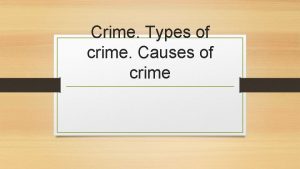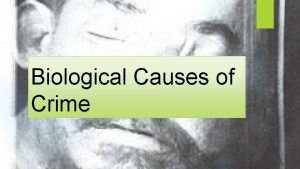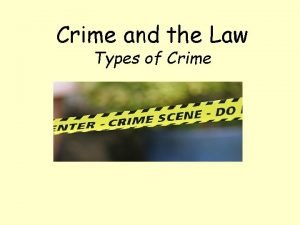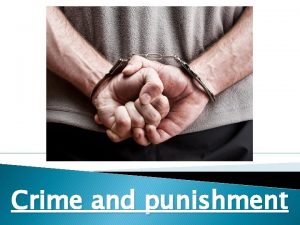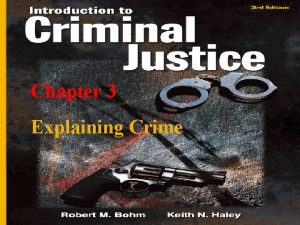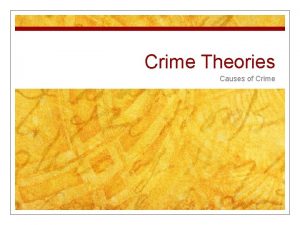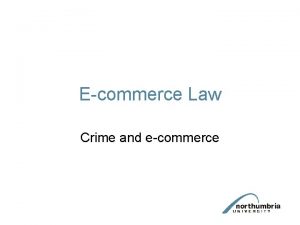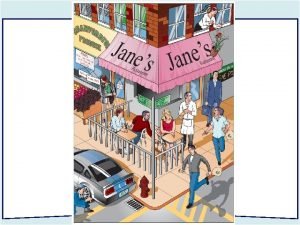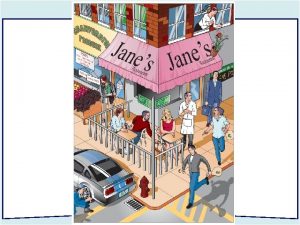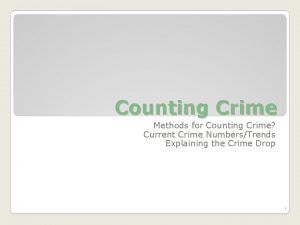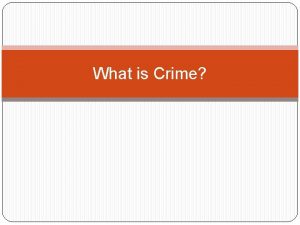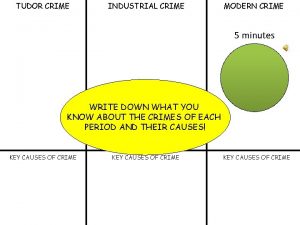Crime and the Law Causes of Crime Today





























- Slides: 29

Crime and the Law Causes of Crime

Today we will… • Identify various different causes of crime • Describe biological reasons for crime • Explain sociological reasons for crime Success Criteria • Match up causes of crime • Create a “biological” criminal profile • Explain sociological reasons for crime

What causes crime? There is no one agreed cause of crime. In Modern Studies because it cannot be proven that something is a cause of crime we will explore a range of possible causes which “may” lead to crime. Depending on your ideology (your political belief system) you may think some causes are more likely than others. What do you think causes crime? • Sociological reasons – your education, peer pressure • Economic reasons – unemployment, poverty • Biological reasons – how you look, the genes you have

Ideology There are two main theories that underpin why people commit crime. One is called individualist and the other collectivist. Listen carefully over the next two slides, you will have to remember what is on these slides and take notes, using only a diagram to help you. See how much you can remember.

Individualists • Individualists tend to focus on personal weakness as the reason a crime is committed. • If someone chooses to offend, that is their responsibility and if caught, they should suffer the consequences. • Individualists believe that if punishments were stronger and the police and courts had more powers, there would be less crime.

Collectivists • Collectivists feel that society is unequal and some people are at greater risk of being influenced by criminal behaviour, often through the actions of parents or friends. • In order to tackle crime, collectivists feel that the social conditions which create the incentive for crime need to be addressed. • This could be through better housing, improved employment opportunities and a more equal society to make crime less of an attraction. If people are in work and are content with life they will be less motivated to break the law.

Lesson Starter Why do people commit the following crimes? : • Littering • Graffiti • Assault • Theft • Underage Drinking

See how much you can remember. Using the headings Individualist and Collectivist, and the image on screen, see how detailed your notes can be.

Sociological Reasons for Crime Geography Boredom Poverty What factors would lead to crime? Labelling Alcohol and drugs Lack of Education Social Exclusion Peer Pressure

Causes of crime inter-link and over-lap, there is no easy explanation.

Poverty – social/economic reason Jealousy – people from poorer backgrounds may envy the quality of life and material possessions of people from a more wealthy background. Example - A study in 2013 found that 29% of Scots lack three or more of the necessities for basic living. Poverty leads people to stealing because people try and meet their basic needs for food and shelter, or to finance addictions to drugs or alcohol.

Social Exclusion • ‘Underclass’ - people who may be unemployed, have few qualifications, live in poor housing and rely on benefits to get by. • Feel excluded from society due to not being able to function in normal society, due to lack of funds. EG/ not having a mobile phone. • To solve their problems they turn to crime to pay for a lifestyle they believe can never be achieved by legal means.

Peer Pressure • Pressure to act/behave a certain way when amongst your peers. • If a person doesn't conform to the values of their peer group then they can face ridicule, threats or exclusion from the group. • Boredom and peer group pressure can prove to be a powerful combination.

Lack of Education • The better standard of your education, the less likely you are to be involved in crime. • Better education = a higher income • Those with a poor standard of education have limited options in terms of employment and then may turn to crime to get the things they want.

Poor Role Models • In some deprived communities the role models are not hard-working people earning a good income but criminals and gang members. • In areas with high crime rates there may be so much crime that it is seen as normal to break the law. • If they get involved in gangs then the gang leaders become their role models and they get even more caught up in criminal activity.

Alcohol and Drugs Crimes such as assault, violence, petty crime and breach of the peace are frequently fuelled by alcohol and drugs. Alcohol and drugs can impair judgement and encourage people to make decisions they wouldn’t usually. 62 % 26 % 30 %

Glasgow Gangs Watch the clip and answer the following questions: 1. What problems exist in some areas of Glasgow? 2. Is there any one reason why these boys are members of gangs? 3. What kinds of crime are/could these boys be accused of? 4. Is there one single cause of crime in this case?

Activity In your notepad copy and complete the following sentences using all of the information you have learned from the previous exercises. 1. Poverty can lead to crime because… 2. Unemployment can lead to crime because… 3. Drink and drug abuse can lead to crime because… 4. Peer group pressure can lead to crime because…

Remember! • Not everyone who lives in poverty is a criminal. • Not everyone who receives a poor education goes on to be a criminal. • Not everyone who has an alcohol or drug problem is a criminal. • Not everyone who had poor role models is a criminal. • Not everyone who is greedy is a criminal. • Not everyone who suffers from peer pressure becomes a criminal.

Biological reasons for crime This is the idea that a person is biologically programmed to commit a crime – it is in their genes, they cannot help but commit crime. They assume that some people are "born criminals" — they're biologically different from non-criminals.


Biological reasons for crime Gender There are key patterns in criminal behaviour according to gender. Men commit far more crime than women. This may be explained through biological differences between men and women. As a result of hormone differences women tend to be less aggressive as they have lower testosterone levels. For example, According to the latest statistics men committed 84 per cent of all crimes in Scotland in 2017

Biological reasons for crime Born Evil Some would argue that individuals can naturally be ‘born evil’ and that physiologically are different from other individuals. This is the ‘nature’ argument. Some believe that individuals are born inherently different from others and it is in their genetics to be a criminal. This can be applied to certain types of criminals particularly those who commit violent offences. For example, they would argue that criminals have no choice, it is ‘nature’ and they have no control over it.

Psychopaths Some people are defined as psychopaths or sociopaths, this fits into our nature argument of the debate. Some individuals go onto commit horrifying crimes and yet show no remorse or give any reasoning for their actions. A psychopath or sociopath is someone who has a personality disorder. They often lack empathy or remorse and often display anti-social behaviour. https: //www. youtube. com/watch? v=Oj. Be. QSx_R 90

Biological reasons for crime Mental Health issues Some people have mental health issues which cause them to make irrational decisions. There also other mental health conditions which make it difficult for the sufferers to distinguish between right and wrong. If someone has a mental health issue and it goes untreated, yes, they may be more likely to commit a crime but this can be for various reasons. Often when someone has an undiagnosed mental health issue they are more likely to be a harm to themselves or try to self-medicate. For example, 90% of all prisoners had a mental health problem and that 70% had two or more problems (often mental health and some form of addiction). In effect, mental ill-health is the norm for the UK’s prison

National Institute of Drug Abuse This is an instance of a biological factor resulting in drug usage, which as we know is a crime!!!

Pleading insane The insanity defence, also known as the mental disorder defence, is a defence in a criminal case, arguing that the defendant is not responsible for his or her actions due to one-off or persistent mental health issues at the time of the criminal act. 90% of those who raise the insanity defence in Britain have a diagnosed mental illness.

SQA TASK 1. Explain, in detail, 3 reasons why some people commit crime. (8)

Exit Pass • I can identify…. • I can describe…. • I can explain…. #Yourlearning Choose one of the sentences starters above and identify/describe/explain something which you learned during the past two lessons about the causes of crime!
 Newton's first law and second law and third law
Newton's first law and second law and third law Newton's first law of motion
Newton's first law of motion For today's meeting
For today's meeting In todays lesson
In todays lesson Today meeting or today's meeting
Today meeting or today's meeting Today lesson or today's lesson
Today lesson or today's lesson Today's lesson or today lesson
Today's lesson or today lesson Today's lesson or today lesson
Today's lesson or today lesson Ultimate vs proximate causation
Ultimate vs proximate causation Altruistic behavior
Altruistic behavior Boyle's law charles law avogadro's law
Boyle's law charles law avogadro's law Avogadro's law constant
Avogadro's law constant Hình ảnh bộ gõ cơ thể búng tay
Hình ảnh bộ gõ cơ thể búng tay Bổ thể
Bổ thể Tỉ lệ cơ thể trẻ em
Tỉ lệ cơ thể trẻ em Chó sói
Chó sói Thang điểm glasgow
Thang điểm glasgow Chúa sống lại
Chúa sống lại Các môn thể thao bắt đầu bằng tiếng nhảy
Các môn thể thao bắt đầu bằng tiếng nhảy Thế nào là hệ số cao nhất
Thế nào là hệ số cao nhất Các châu lục và đại dương trên thế giới
Các châu lục và đại dương trên thế giới Công thức tính thế năng
Công thức tính thế năng Trời xanh đây là của chúng ta thể thơ
Trời xanh đây là của chúng ta thể thơ Mật thư anh em như thể tay chân
Mật thư anh em như thể tay chân 101012 bằng
101012 bằng độ dài liên kết
độ dài liên kết Các châu lục và đại dương trên thế giới
Các châu lục và đại dương trên thế giới Thơ thất ngôn tứ tuyệt đường luật
Thơ thất ngôn tứ tuyệt đường luật Quá trình desamine hóa có thể tạo ra
Quá trình desamine hóa có thể tạo ra





























